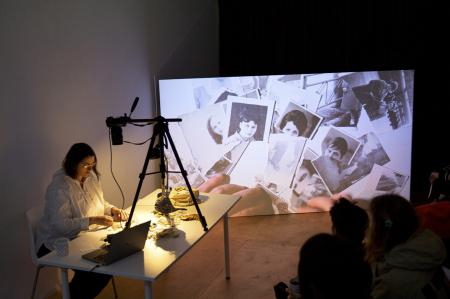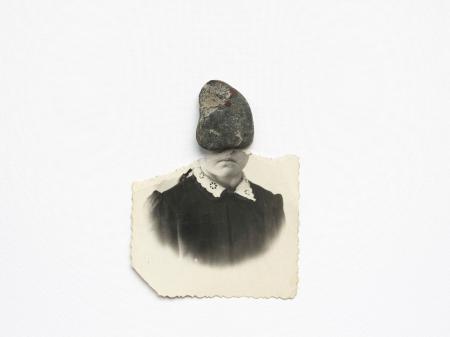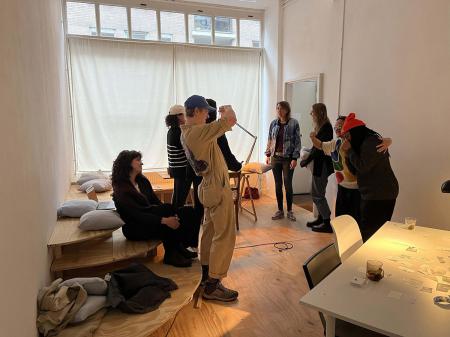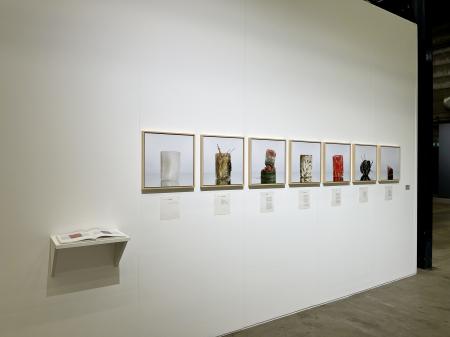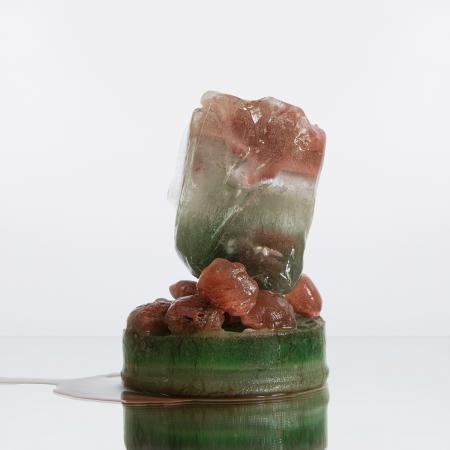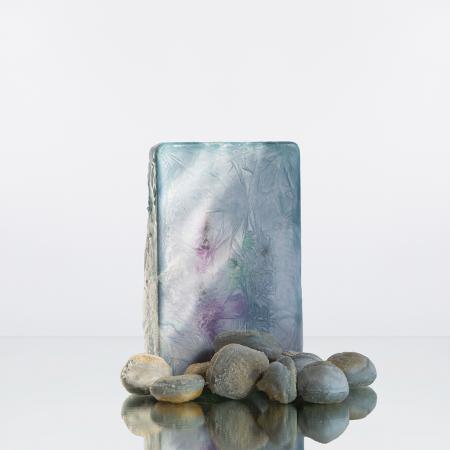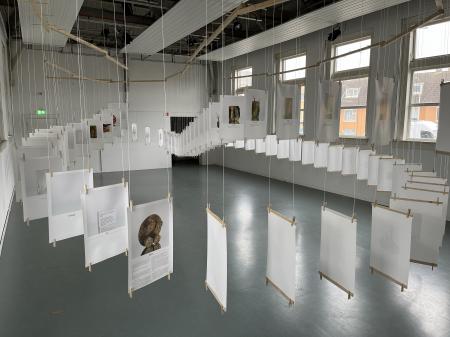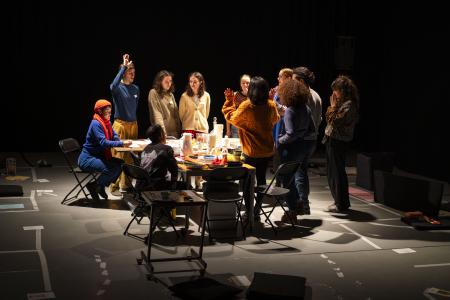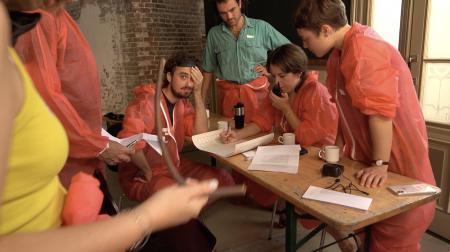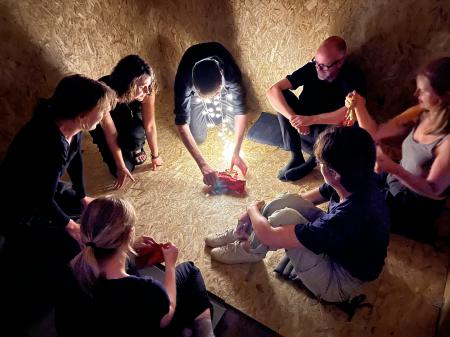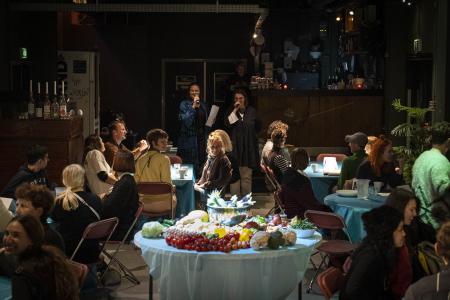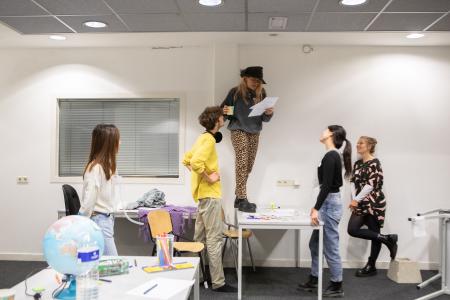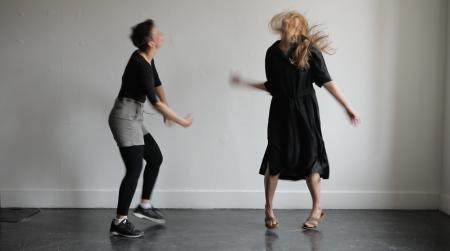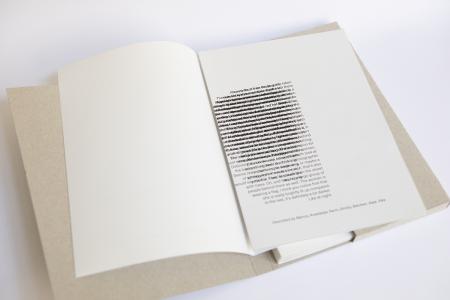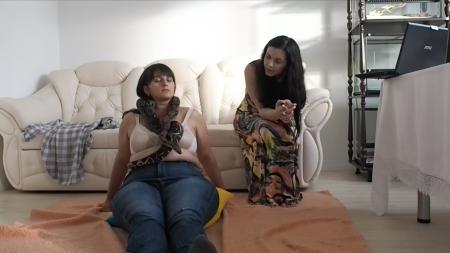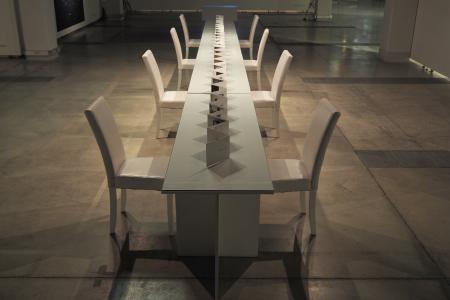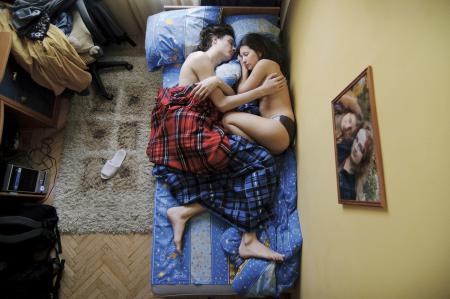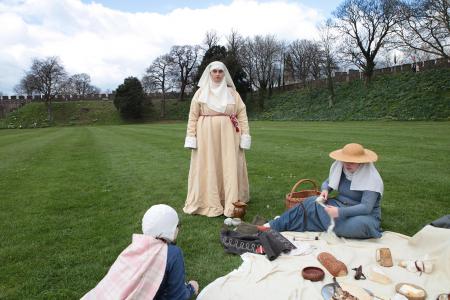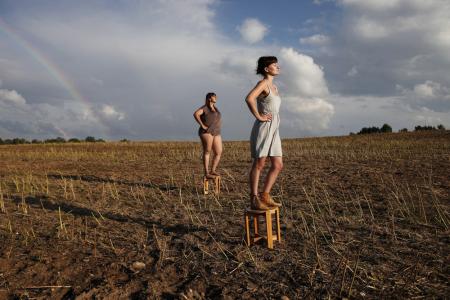-
info
In het voorjaar van 2018 nam Jana's oudtante Lucia het bewuste besluit om te stoppen met haar medicijnen en overleed enkele dagen later. Om redenen die aanvankelijk willekeurig leken, verscheurde Jana's grootmoeder alle foto's in Lucia's familiearchief en stond op het punt ze weg te gooien, totdat Jana haar tegenhield. Sinds dat moment heeft Romanova jarenlang geprobeerd om te herstellen wat er van die foto's over was. Dit werk is een voortdurend onderzoek naar de maatschappelijke druk om iemands identiteit en waarde te definiëren door te voldoen aan de verwachtingen van de familie op het gebied van werk, inkomen, succesvolle huwelijken en bepaald gedrag, waarbij wordt gekeken naar de emotionele tol die het voelt om ontoereikend te zijn in een cultuur die productiviteit en gehoorzaamheid boven alles stelt. In de voorstelling probeert Jana haar vernietigde familiearchief te herstellen met behulp van verschillende technieken en voorwerpen. Terwijl ze werkt, vertelt ze het verhaal van haar tante Lucia, die onvermoeibaar probeerde haar plaats in de wereld te vinden, vaak via twijfelachtige baantjes die steevast op een mislukking uitliepen.
-
info
Dit werk bestaat in drie vormen: fotografie, performance en een rollenspel. In de fotografische vorm werkt Jana Romanova met het verscheurde familiearchief van haar oudtante Lucia. Ze probeert het niet letterlijk te herstellen, maar via verschillende objecten en technieken — en juist ook via de mislukkingen die tijdens dit proces ontstaan.
-
info
Dit werk ontvouwt zich in drie vormen: fotografie, performance en een rollenspel. In het rollenspel reconstrueren deelnemers gezamenlijk het verscheurde archief door familieleden te creëren, verborgen verhalen te spelen en te ontdekken waarom het werd vernietigd.
-
info
An exhibition of Water Portraits selection at Prospects exhibition by Mondriaan Fonds during Art Rotterdam. In “Water Portraits” I ask people to reuse one liter of freshwater one after another until it’s gone. After each usage, I freeze the water and take its portrait. Each portrait gets the name of the person who used it, and a recipe for how the water was reused. After each liter is exhausted, I start a new one. One hundred and one participants took part in this project in 2021-2024. The longest chain of using one liter of water consists of 15 stages, and the shortest one consists of 1.
-
info
In “Water Portraits” I ask people to reuse one liter of freshwater one after another until it’s gone. After each usage, I freeze the water and take its portrait. Each portrait gets the name of the person who used it, and a recipe for how the water was reused. After each liter is exhausted, I start a new one. One hundred and one participants took part in this project in 2021-2024. The longest chain of using one liter of water consists of 15 stages, and the shortest one consists of 1.
-
info
Water Portraits. Masja. In “Water Portraits” I ask people to reuse one liter of freshwater one after another until it’s gone. After each usage, I freeze the water and take its portrait. Each portrait gets the name of the person who used it, and a recipe for how the water was reused. After each liter is exhausted, I start a new one. One hundred and one participants took part in this project in 2021-2024. The longest chain of using one liter of water consists of 15 stages, and the shortest one consists of 1.
-
info
Water Portraits installation at See Lab in The Hague created with a support of Stroom Den Haag. In “Water Portraits” I ask people to reuse one liter of freshwater one after another until it’s gone. After each usage, I freeze the water and take its portrait. Each portrait gets the name of the person who used it, and a recipe for how the water was reused. After each liter is exhausted, I start a new one. One hundred and one participants took part in this project in 2021-2024. The longest chain of using one liter of water consists of 15 stages, and the shortest one consists of 1.
-
info
In “Water Portraits” I ask people to reuse one liter of freshwater one after another until it’s gone. After each usage, I freeze the water and take its portrait. Each portrait gets the name of the person who used it, and a recipe for how the water was reused. After each liter is exhausted, I start a new one. One hundred and one participants took part in this project in 2021-2024. The longest chain of using one liter of water consists of 15 stages, and the shortest one consists of 1. Installation design — Johannes Equizi Graphic design — Sonya Umanskaya
-
info
“DreamHouse” is a 4-6 hours-long role-playing experience in which participants are invited to take roles of housemates living together in a speculative near future. In this future, AI assistants are big part of everyone’s life. A housing corporation “DreamHouse” has recently introduced a project where tenants' rent depends on how well they live as a community in a shared household. AI technology is there to help them maintain possible communication issues. And evaluating how well they perform it. The role-play is designed for 14 participants and includes a character-building workshop, a play, and a debrief. The play is created around several cycles of Nights and Days, during which the scene has different lighting. During the Day, participants interact with each other, trying to solve all sorts of communal and personal dilemmas, but also with AI voice assistant asking it for help or trying to avoid its attention.
-
info
The Last Submarine is a climate fiction role-play about water scarcity designed by artists Jana Romanova and Sophie Allerding. The story takes place in a speculative future in which sea levels have risen, the land is long gone and humans are living in floating cities. Fresh water is the most precious resource and has become the new currency. Participants play a submarine crew sent on a mission with the last resources to find a new source of fresh water and hopefully save the future of humanity. The play has both a dramatic and humorous tone, the playtime is 6 hours (variable) including a workshop, and debriefing, for 10-12 players.
-
info
“The Shimmering Land” role play takes its name and inspiration from the exhibition that features the artworks of Crimean artists Natalia Grezina and Anton Yermolov, who have been working alongside curator Marth von Loeben on a project about the lost heritage. The exhibition is currently on the show at Chrysalid Gallery and the play will take place in one of its rooms on the 25th and 26th of August. You can choose one or these dates to participate. During this short role playing game, participants will play roles of 7 objects from the collection of Scythian gold that inspired the exhibition. At the start of the game, objects awake while being transported inside a box in a vehicle. They don’t know their destination, yet as rare objects which belonged to Scythian kings and noble men and women, they have some ancient powers to influence their route. This event is an experimental way to discuss the notion of agency, heritage, and the sense of belonging through collective storytelling and co-creating an experience. The play is designed and facilitated by artist and play designer Jana Romanova in the conversation with Natalia Grezina, Anton Yermolov and Marth von Loeben.
-
info
A Dinner for Tired and Busy People is a dinner game organized by artists Jana Romanova and Anastasia Loginova on November 17th, 2022 at PIP nightclub for PIP Expo in The Hague. During this evening, several important questions circulating around why we are so busy and tired were posed in an effort to finally resolve them. As tired & busy people, participants were able to choose a question they can deeply relate to and share their experience with others who feel the same. By the end of the evening, the answer to their question was served to them in the form of a dish someone cooked for them, while they were cooking an answer to someone else’s question. This event was a dinner experience for 30 people organized as a part of the program of PIP Expo curated by Laura Snijders & Alex Webber with the generous support of PIP & Stroom Den Haag Documentation images by Helena Roig
-
info
I don’t think I’ll stay here long tells the stories of women who fled Ukraine due to the Russian invasion in February 2022 and are currently hosted by families across the Netherlands. In a three-channel installation, actress Ewa (Yarasolva Krutova) performs a series of monologues on behalf of these women, detailing their efforts to find common ground and learn how to live alongside strangers in spite of their cultural differences. The project brings together complex narratives about loneliness and togetherness; kindness and cultural clichés; humour and sorrow; but also the hope to call a place home again. Jana Romanova is a film director and producer.
-
info
“Where the Ink Starts” is a live-action role play (LARP) about artists’ relationships with their creativity in the situation of time and daily life pressure created by artists Jana Romanova and Johannes Equizi. The game begins with a group of writers squatting in their studio space and having to finish their script before a deadline set by Spark Press, a famous publishing house. To be published by Spark Press is the right chance for the writers to gain income and move out of the studio. The twist of this game lies in the fact that every writer is played by two people. A participant may become either a writer or a writer’s creativity. Both of them will need to find a way to work with each other to finish a written piece on time. By looking at creativity as a separate entity with its own will and mysteries, this game invites participants to reflect on how to deal with their own creativity and with fellow artists who are in a similar situation of daily life crisis. In many ways, this game is about finding peace with your own mind in the situation of pressure that every creative person goes through on a daily basis.
-
info
“Chin Up Chin Down” is a participatory performance, a game, that reflects upon the relationships between a photographer, the one being photographed, and a camera. Two people are giving each other multiple instructions — where to move, where to look, how to feel. Their communication is based on controlling each other in front of a camera and for the camera. This project exists in the form of video documentation of each game and its translation into a format of a booklet. “Chin Up Chin Down” looks into when and how do we become readable images and challenges the language of power.
-
info
“Chin Up Chin Down” is a participatory performance, a game, that reflects upon the relationships between a photographer, the one being photographed, and a camera. Two people are giving each other multiple instructions — where to move, where to look, how to feel. Their communication is based on controlling each other in front of a camera and for the camera. This project exists in the form of video documentation of each game and its translation into a format of a booklet. “Chin Up Chin Down” looks into when and how do we become readable images and challenges the language of power.
-
info
https://janaromanova.com/images-i-can-t-show
-
info
A documentation of the show at the Copenhagen Photo festival. I found a lot of courses in Russia offering practices that teach women special ways of interacting with the world: how to collect feminine energy, follow the moon calendar, «breathe» with your womb, find a goddess inside yourself and change reality around you. I started to visit femininity teachers to see if I could understand what femininity is and if it could help me. «When a woman becomes feminine she can get everything she needs only by thinking about it. Every woman can have this power. You can also have it if you want. The only thing you need is to accept who you are and learn how to raise your feminine energy» were some of the mantras told to me by over fifty female coaches I met over the course of nearly one year in Moscow and Saint Petersburg. Many teachers offered me an experience of femininity through bodily senses and emotions, which also formed part of their theory: femininity can’t be explained, it can only be felt.
-
info
"When I was a child, my parents often told me things like, “Girls don’t wear wrinkled clothes” or “Don’t climb trees, you’re a girl”. I never questioned these rules until I became an adult. Throughout my life, my relatives have told me that I’m not very feminine and that this is the reason for all of my problems. I have always engaged in arguments around this issue, but eventually decided to google how to become more feminine. I found a lot of courses in Russia offering practices that teach women special ways of interacting with the world: how to collect feminine energy, follow the moon calendar, «breathe» with your womb, find a goddess inside yourself and change reality around you. I started to visit femininity teachers to see if I could understand what femininity is and if it could help me. «When a woman becomes feminine she can get everything she needs only by thinking about it. Every woman can have this power. You can also have it if you want. The only thing you need is to accept who you are and learn how to raise your feminine energy» were some of the mantras told to me by over fifty female coaches I met over the course of nearly one year in Moscow and Saint Petersburg. Many teachers offered me an experience of femininity through bodily senses and emotions, which also formed part of their theory: femininity can’t be explained, it can only be felt. On the one hand, this experience became a way to think about the position of women in contemporary Russia. In places where rights for men and women are still not equal, the interpretation of gender stereotypes into a form of irrational power could provide possibilities for women to gain control over their lives. On the other hand, this project became an investigation into the connection between our desire to believe in magic, irrational powers and a means to reach happiness by effortlessly fulfilling our wishes. The project consists of several types of documentation. There are portraits of different coaches whom I asked about femininity, some text records of their stories and a video projection that documents the feminine energy practices they offered me. The final part of the project is a site-specific video performance: I appear on television and share my “newfound feminine energy” with everyone who wants to receive it, following the theory that every woman gains magic powers as soon as she accepts her true self.
-
info
“Shvilishvili” is Georgian for “grandchild”, literally it could be translated as “a child of a child”. In this project, presented as book-object, the author questions the value of family photography and family ties themselfs in modern society through an attempt to unite her relatives from one blood line by photography. The family is divided between two countries — Russia and Georgia, — and the problems of it’s members on both sides of the border arise from the post-war political situation as well as the tragic story of a murder committed inside the family.
-
info
Video documentation of the book. In March 2014 the tension between Russia and Ukraine started to grow high, inspired by the informational war on the situation in Crimea and Eastern Ukraine. Citizens of both countries started to loose the desire to understand each other. Romanova asked different people who took part in the revolution in Kiev at the Square of Independence, to remember words which are absolutely the same both in Russian and Ukrainian languages and illustrate these words for the photographs — to make a sort of ABC, based on the idea that understanding starts from language, and language starts from alphabet.
-
info
It is early morning and young Russian couples, inhabitants of Saint Petersburg and Moscow, are sleeping in their bedrooms. They're preparing to become parents in few months, and the camera documents both their poses and also the details of their interiors. Bed sheets, objects of daily life and decorations tell how the last generation born before the fall of the Soviet Union currently lives in big cities of modern Russia. 40 images in complete series Saint Petersburg, Moscow 2009-2015
-
info
Traveling across Wales — whose people have been struggling for their identity ever since they lost their independence in the Middle Ages — Russian photographer Jana Romanova experimented with her own identity and tried to become Welsh, following advice from local people.
-
info
Video documentation of the book. “Shvilishvili” is Georgian for “grandchild”, literally it could be translated as “a child of a child”. In this project, presented as book-object, the author questions the value of family photography and family ties themselfs in modern society through an attempt to unite her relatives from one blood line by photography. The family is divided between two countries — Russia and Georgia, — and the problems of it’s members on both sides of the border arise from the post-war political situation as well as the tragic story of a murder committed inside the family. In the first part of the project the representatives of Romanova’s family pose for group portraits to form a chain of images where each relative always appears in two photographs: the previous and the next. The chain of photographs starts in Georgia, goes though several villages and cities and ends in Russia. While working on the chain, Romanova discovered a lot of her grandmother Keto’s photographs in each of the blood-line relative’s houses. Keto started to send these images to her family in Georgia since she got married and moved to Russia. Failed to understand anything about her biography out of those images, Romanova puts portraits of her grandmother back into the old plastic bags as her relatives kept them for many years — and rephotographes as new shapes and also an evidences of grandmother’s life, that now nobody can explain and understand. The shape of the book is unhandy and questions the necessity of a family album in modern society, being an “anti — family album” itself.
-
info
This project is an exploration of the concept of beauty and femininity in modern society through a series of self-portraits. I asked different young women to choose poses for a portrait and copied them, standing nearby or in the background. My attempts to perform exact copies of their poses and expressions create an ironic image and address the societal attitude towards women and the role photography plays in it. Latvia, Russia 2011-2018
Websites
Social media
Curriculum vitae
Opleidingen
-
2019 - 2021MA Photography and Society Den Haag, Koninklijke Academie van Beeldende Kunsten Diploma behaald
-
2016 - 2016Joop Swart Masterclass World Press Photo
-
2001 - 2006Journalist Saint-Petersburg State University Diploma behaald
tentoonstellingen
-
2025The Broken Archive The Balcony Den Haag, Nederland A performance and a live-action role-playing game about family archives and acceptance thebalconythehague.com/The-Broken-Archive Solo
-
2025Water Views VU Art Science Gallery Amsterdam, Nederland Water Views brings us the perspectives of artists and researchers on the topic of water through transdisciplinary exchange. In an exhibition and a series of dialogues several approaches to water will be explored, from the colonial trade routes to the ecological impact of our changing climate, to old and new aquatic thinking. With works by Valerie van Leersum, Tanja Engelberts, Suzette Bousema, Huniti Goldox and Jana Romanova. www.artsciencegallery.nl/exhibition/water-views/ Groep
-
2024Water Portraits Museum Hilversum Hilversum, Nederland 'Water Portraits', van de jonge kunstenaar Jana Romanova, verkent op een speelse en onderzoekende manier ons waterverbruik. Aan de hand van de fotografische documentatie van 101 ijssculpturen nodigt zij jou uit om na te denken over hoe we zorgdragen voor de mensen om ons heen en de toekomstige generaties. Jana Romanova studeerde journalistiek maar stapte over naar de beeldende kunst. De sociaal maatschappelijke betrokkenheid, het zoeken naar maatschappelijk relevante thema’s en de connectie met het publiek lopen als een rode draad ook door haar praktijk als kunstenaar. www.museumhilversum.nl/nl/tentoonstellingen/jana-romanova-water-portraits Solo
-
2024Intertwined Namuso Gallery Den Haag, Nederland GALLERY EXHIBITION | Namuso Gallery proudly presents Intertwined, a duo exhibition featuring the works of multidisciplinary artist Jana Romanova and visual artist Jaeyoung Park. Both artists explore the interconnectedness of human experience through their distinctive mediums, offering viewers a unique reflection on memory, connection, and the passage of time. namuso-gallery.com/exhibitions/10-jana-romanova-jaeyoung-park-intertwined/ Duo
-
2023The Grand Palace of Everyone Nest Den Haag, Nederland "I Don't Think I'll Stay Here Long" created in collaboration with Ewa Kruttova is a pat of this show. Welcome to ‘The Grand Palace of Everyone’, a land without borders where collaboration reigns. Together with No Limits! Art Castle (formerly known as Outsiderland) we tear down the walls between fantasy and reality, art and design, and ‘insider’ and ‘outsider’ artists. Why would anyone decide who is ‘professional enough’ to enter the gates? ‘The Grand Palace of Everyone‘ rolls out a black and white carpet for the work of over sixty artists in 26 unique collaborations between talented and dedicated artists. Side by side they find their way in the art world and present a broad scope of collaborations in every nook and cranny of Nest. Never before have so many artists shared the space in one exhibition. www.nestruimte.nl/en/exhibition/the-grand-palace-of-everyone/ Groep
-
2023Water Portraits See Lab Den Haag The Hague, Nederland In the "Water Portraits" project, Jana Romanova invites participants to consecutively reuse one liter of freshwater until it's depleted. After each use, she freezes the water and takes its portrait. These frozen portraits receive the names of their users, along with a recipe for how the water was repurposed. As one cycle concludes due to the depletion of water, a new cycle begins. This exhibition at See Lab features approximately 80 works that document this ongoing process for the last two years. "Water Portraits" delves into the interconnectedness of our actions, temporary ownership of resources, and the evocative passage of time. The exhibition is created with a support of Stroom Den Haag www.seelab.nl/program/2023/waterportraits-jana-romanova Solo
-
2022The Ways of Water Melkweg Expo Amsterdam, Nederland The group exhibition 'The Ways of Water', on display at Melkweg Expo from June 3 to July 10, 2022, explores the relationship between humans and water through photography and art installations: humankind's dependence, but also his subordination to water. . Numerous (inter)national and multimedia artists investigate the influence of man-made climate change, pollution and water depletion on our planet: Suzette Bousema, Jana Romanova, Koos Buster, Mazen Al Ashkar, Frank Bloem, Tina Farifteh, The Water School (initiated by studio Makkink & Bey) and Elise 't Hart. www.melkweg.nl/en/expo/ Groep
-
2022A Call to a Friend W139 Amsterdam, Nederland On 3d of April 15.00 at @w139amsterdam I called my friends. There were people who are in Ukraine doing as much as they can to help those near them. Others are around the world creating initiatives to support those who left the country and bring important supplies to the danger zones. Some are resisting the regime and protest in Russia. This event is an opportunity to find different ways to help — from important personal stories by those strongly affected by the Russia’s government war in Ukraine. w139.nl/en/ Solo
-
2022I Don't Think I'll Stay Here Long No Limits Art Castle (formerly Outsiderland) Amsterdam, Nederland In this project multiple stories of women who came to the Netherlands during the last months of Russian invasion to Ukraine are told through the voice and body of one actress. In a three-channel installation Ewa Kruttova reenacts several monologues of Ukrainians who are hosted by families in different Dutch cities. They speak about their attempts to find understanding and live together with strangers despite cultural and habitual differences. It is a complex narrative about loneliness and togetherness, kindness and cultural cliches, humour and sorrow, but also about support and a hope to have home again. This project is created in collaboration with Ewa Kruttova and support of No Limits Art Castle (formerly Outsiderland) in Amsterdam. Solo
-
2022PAN Amsterdam PAN Amsterdam Amsterdam, Nederland "Water Portraits" project was exhibited together with several other ecologically and socially engaged project supported by MIAP Foundation in the last 10 years. www.pan.nl/en/dealerdetails/281/miap-foundation Groep
-
2021Chin Up Chin Down KABK Graduation Show The Hague, Nederland “Chin Up Chin Down” is a participatory performance, a game, that reflects upon the relationships between a photographer, the one being photographed, and a camera. Two people are giving each other multiple instructions — where to move, where to look, how to feel. Their communication is based on controlling each other in front of a camera and for the camera. This project exists in the form of video documentation of each game and its translation into a format of a booklet. “Chin Up Chin Down” looks into when and how do we become readable images and challenges the language of power. graduation2021.kabk.nl/students/jana-romanova Groep
-
2019(Beside)Yourself Photographic musem Metenkov's House Yekaterinburg, Rusland "Losing 31 of August", "Close Relationship", "Goddess Guide" and "W" were presented at this big solo show. dommetenkova.ru/exhibitions/2019/romanova Solo
-
2017Photobook Phenomenon CCCB Barcelona, Spanje The exhibition highlights the role of the photobook in contemporary visual culture and takes it as the departure point for a reinterpretation of the history of photography. "Shivilishvili" project was exhibited at this group show. www.cccb.org/en/exhibitions/file/photobook-phenomenon/225004 Groep
-
2017https://issuu.com/copenhagenphotofestival/docs/cpf2017-program__12._maj-/39 Copenhagen Photo Festival Copenhagen, Denemarken "The Goddess Guide" and "W" projects exhibited in several rooms of a former power plant in the center of the city. issuu.com/copenhagenphotofestival/docs/cpf2017-program__12._maj-/39 Solo
-
2016There is something about my family FOTODOK Utrecht, Nederland In There is Something about My Family, 15 makers explore the influence of immigration, war, ideologies and other (major) societal changes on family ties. My project "Shvilishvili" was exhibited at this group show. www.fotodok.org/en/there-is-something-about-my-family/ Groep
-
2016Adopted Welsh Ffotogallery Cardiff, Verenigd Koninkrijk Being a foreigner in Wales, I started a series of one-to-one conversations with different people who consider themselves Welsh, asking them to describe Welsh person, Welsh identity to me and in the end asking if they think I can also become Welsh. Out of almost 50 interviews in different parts of Wales, there was only one negative answer, while everybody else provided me with different recommendations on becoming Welsh. I took all of these suggestions and made them my regular practice. Every day for two months I tried to become part of different groups of people who are doing something together across Wales, changing my appearance in order to fit properly, to be less visible as a stranger. This practice became a search not only for what is national identity, but mainly a search for community, for a place and a moment where community exists.’ europeanprospects.org/channel/jana-romanova-adopted-welsh Solo
-
2016The Alphabet of Shared Words the Museum of Photography Braunschweig, Duitsland The work »Shvilishvili« (grandchild) was preceded by a private process of rapprochement with the Georgian family branch of the photographer. In the sense of an “anti-photo album” the work reflects the function of the family album as a collective visual memory which enhances the memory of a special event. In so doing, the work brings together visually the photographer’s relatives who are spread over two countries and who have lost contact with one another because of the political framework as well as the occurrence of a tragic death. As a visual construction of this family history, the “anti-photo album” reveals in a medial reconstruction how photographic insights into personal biographies and the complexity of individual destinies cannot be made to agree, and that such biographies cannot really be visually captured by photographic documentation. The work »Immerse«, on the other hand, which arose in 2014, set off a physical confrontation of young adults with the legacies of the political show of force in Sevastopol in Crimea. Immersing in history and interacting spatially with the monuments, the portrayed persons endeavour to find their bearings. In this process, the ironic comparison between physical self-presentation and the monument produces a contrast that can hardly be more sharply defined. www.photomuseum.de/jana-romanova-the-alphabet-of-shared-words/ Solo
projecten
-
2022
I Don't Think I'll Stay Here Long Den Haag, Nederland www.fotodok.org/evenement/outsiderland-x-fotodok/ I don’t think I’ll stay here long vertelt de verhalen van vrouwen die Oekraïne zijn ontvlucht vanwege de Russische invasie in februari 2022 en nu worden opgevangen door families in heel Nederland. In een installatie met drie kanalen voert actrice Ewa (Yarasolva Krutova) namens deze vrouwen een reeks monologen op. Ze vertelt over hun pogingen om een gemeenschappelijke basis te vinden en te leren hoe ze ondanks hun culturele verschillen met vreemden kunnen samenleven. Het project brengt complexe verhalen samen over eenzaamheid en saamhorigheid; vriendelijkheid en culturele clichés; humor en verdriet; maar ook de hoop om een plek weer thuis te kunnen noemen. I don’t think I’ll stay here long is een samenwerking tussen actrice en performancekunstenaar Ewa (Yaroslava Krutova) die in maart 2022 vanuit Oekraïne in Nederland aankwam, en lensgebaseerd kunstenaar Jana Romanova die in 2019 vanuit Rusland naar Nederland kwam. Het project wordt geproduceerd en gepresenteerd bij Outsiderland, met informatieve steun van FOTODOK.
-
2022
Water Portraits Message in a Photo Foundation Amsterdam, Nederland www.miap.nl/about/ In this project I invite participants to reuse 1 liter of water one after another until it’s gone or nobody else is ready to deal with it. The water is frozen in between the usages, and every volunteer receives it in the form of an ice cube. From an experiment in finding a creative way of using water productively, it became a project that asks questions about what does it mean to “use” and when it seems useless, and what is the role of art in our understanding of recycling, reusing and sustainability. 1.2 billion people, or almost one-third of the world's population, now live in countries with physical water scarcity, and using a very limited amount of freshwater for all needs is an exercise they do every day. And, according to the UN’s World Water Development Report, 40% of the population of Earth will already suffer from water stress by 2030.
-
2021
Chin Up Chin Down The Hague, Nederland janaromanova.com/chinupchindown “Chin Up Chin Down” is a participatory performance, a game, that reflects upon the relationships between a photographer, the one being photographed, and a camera. Two people are giving each other multiple instructions — where to move, where to look, how to feel. Their communication is based on controlling each other in front of a camera and for the camera. This project exists in the form of video documentation of each game and its translation into a format of a booklet. “Chin Up Chin Down” looks into when and how do we become readable images and challenges the language of power.
-
2021
Images I Can't Show The Hague, Nederland janaromanova.com/images-i-can-t-show “Images I can’t show” is a photobook without photographs. All images in it can be described, but not shown publicly for various reasons — ethical dilemmas, political danger, concerns about representation. Using those photographs from her own archive created over the course of 20 years as case studies, photographer Jana Romanova discusses dilemmas that contemporary photography faces in a rapidly evolving conversation about ethics.
-
2017
The Goddess Guide Saint-Petersburg, Rusland janaromanova.com/the-goddess-guide I found a lot of courses in Russia offering practices that teach women special ways of interacting with the world: how to collect feminine energy, follow the moon calendar, «breathe» with your womb, find a goddess inside yourself and change reality around you. I started to visit femininity teachers to see if I could understand what femininity is and if it could help me. «When a woman becomes feminine she can get everything she needs only by thinking about it. Every woman can have this power. You can also have it if you want. The only thing you need is to accept who you are and learn how to raise your feminine energy» were some of the mantras told to me by over fifty female coaches I met over the course of nearly one year in Moscow and Saint Petersburg. Many teachers offered me an experience of femininity through bodily senses and emotions, which also formed part of their theory: femininity can’t be explained, it can only be felt.
-
2016
Adopted Welsh Ffotogallery Cardiff, Verenigd Koninkrijk janaromanova.com/adopted-welsh Traveling across Wales — whose people have been struggling for their identity ever since they lost their independence in the Middle Ages — Russian photographer Jana Romanova experimented with her own identity and tried to become Welsh, following advice from local people.
-
2015
Waiting Moscow, Rusland janaromanova.com/waiting It is early morning and young Russian couples, inhabitants of Saint Petersburg and Moscow, are sleeping in their bedrooms. They're preparing to become parents in few months, and the camera documents both their poses and also the details of their interiors. Bed sheets, objects of daily life and decorations tell how the last generation born before the fall of the Soviet Union currently lives in big cities of modern Russia.
-
2014
The Alphabet of Shared Words Kiev, Oekraïne janaromanova.com/the-alphabet-of-shared-words In March 2014, tensions between Russia and Ukraine reached a high point, stoked by the war of information involving the situation in Crimea and Eastern Ukraine. Citizens of both countries started to lose the desire to understand each other. I asked different people who took part in the revolution in Kiev at the Square of Independence to remember words that are the same in Russian and Ukrainian and illustrate these words by posing for portraits. The result is a kind of “ABCs” based on the idea that understanding starts from language, and language starts from the alphabet.
-
2013
Shvilishvili Tbilisi, Georgië janaromanova.com/shvilishvili “Shvilishvili” is Georgian for “grandchild”; it can literally be translated as “a child of a child”. In this project, presented as a book-object, I question the value of family photography and family ties in modern society through an attempt to unite all of my relatives from one bloodline through photography. My family is divided between two countries - Russia and Georgia; the problems between its members on both sides of the border arise from the post-war political situation as well as the tragic story of a murder committed inside the family.
Internationale uitwisselingen / Artist-in-residencies
-
2025Performing Arts Forum (PAF) Saint Erme, Frankrijk I was invited to visit Performing Arts Forum Summer University to present my work and teach a workshop www.pa-f.net/
-
2018Webster University Leiden Campus Leiden, Nederland Residency of the Webster Universtiy Leiden Campus organized by Media Communications department in collaboration with Unseen festival. During this residency I co-organized together with the head of the department Daria Tuminas a one-day workshop "Book Grasp" and prepared a series of videos and live performance on stage of the Unseen Festival called the "Expert Photobook Review" www.facebook.com/events/330660294174587
-
2018Cassis Air Cassis, Frankrijk In January 2018 I've been working in this residency for a month to develop my work-in-progress project "Close Relationship" cassisair.com/
-
2016Docking Station Amsterdam, Nederland Docking Station is a platform where visual stories from different cultures find a form. We do this by charging them with knowledge and then, in co-creation with Dutch creators, turning them into concrete products. In this way, the stories can be more widely shared, and thereby contribute to a more conscious society. www.dockingstation.today/jana
-
2015Ffotogallery Cardiff, Verenigd Koninkrijk During her European Prospects residency with Ffotogallery in Wales, Jana Romanova developed a new body of work titled Adopted Welsh. europeanprospects.org/channel/jana-romanova-adopted-welsh
Aankopen/werken in collecties
-
2016The Alphabet of Shared Words Hirsh Library Houston, Verenigde Staten https://www.mfah.org/research/hirsch-library/
publicaties
-
2015Waiting Boek selfpublished Jana Romanova Saint-Petersburg, Rusland janaromanova.com/waiting-book 24,5 cm x 16 cm 470 gm 96 pages design: Anton Lepashov year of publication: 2015 Young Russian couples, inhabitants of Saint-Petersburg and Moscow, are sleeping in their bedrooms early in the morning, the time when people don’t really care about their appearance, being natural. They are preparing to become parents in few months, and the project investigates not only their attitude to each other during the period of expecting a baby, but also the way young families live in big cities of modern Russia, 20 years after the fall of the Soviet Union, the country that will be known to their children only from history books.
-
2015The Alphabet of Shared Words Boek selfpublished Jana Romanova Saint-Peterburg, Rusland janaromanova.com/the-alphabet-of-shared-words-book Hand-made (the notebook itself is made by Konstantin Ladvischenko) 14 x 18,5 cm Edition of 29 29 archival pigment prints Sold out In March 2014 the tension between Russia and Ukraine started to grow high, inspired by the informational war on the situation in Crimea and Eastern Ukraine. Citizens of both countries started to loose the desire to understand each other. Romanova asked different people who took part in the revolution in Kiev at the Square of Independence, to remember words which are absolutely the same both in Russian and Ukrainian languages and illustrate these words for the photographs — to make a sort of ABC, based on the idea that understanding starts from language, and language starts from alphabet. Each book has a letter, not a number, and a print representing this letter.
-
2012Shvilishvili Boek selfpublished Jana Romanova Saint-Petersburg, Rusland janaromanova.com/shvilishvili-book Hand-made collectors edition of 67 15×32 cm Hardcover (canvas) 106 pages, color weight around 450 gr 4 plastic bags, a rope 1 meter long Print 15×20 cm A box *each 10 copies are somehow different from each other Sold out “Shvilishvili” is Georgian for “grandchild”, literally it could be translated as “a child of a child”. In this project, presented as book-object, the author questions the value of family photography and family ties themselfs in modern society through an attempt to unite her relatives from one blood line by photography. The family is divided between two countries — Russia and Georgia, — and the problems of it’s members on both sides of the border arise from the post-war political situation as well as the tragic story of a murder committed inside the family.
-
2012The Book of Savior Boek selfpublished Jana Romanova Saint-Peterburg, Rusland janaromanova.com/the-book-of-saviour Self-published laser print 19×25 cm 60 pages Edition of 24 + print 15×23 cm When you say it in Russian language there is not much difference between two words: “spasatel’”(“rescue officer” or “firefighter”)” and “spasitel’”(“savior”, “redeemer”, “Jesus Christ”), but the connotations are almost opposite. Rescue officers come when something bad already happened, often they just carry dead bodies and basically they don’t prevent tragedy, but deal only with it’s consequences. The original document is called “The Book of a rescue officer”, and all rescue officers in Russian Federation get one after their first certification. Every owner of this book has to fill it by hand, writing down all the accidents he was involved in as a rescue officer throughout his career. It becomes a sort of a lifetime experience record of seeing people suffering and dying amost every day. Jana Romanova spent two and a half years in a rescue division in Russia, working on a project, exploring what happens with your attitude to death when you meet it every day.
Prijzen en stipendia
-
2024Mondriaan Artist Start (extention) Mondriaan Fonds, Amsterdam (NL) Den Haag, Nederland Received an extension to the Mondriaan Artist Start subsidy for one more year
-
2024ProInvest Subsidy PRO Invest, Stroom Den Haag Den Haag, Nederland
-
2022Mondriaan Artist Start Mondriaan Fonds, Amsterdam (NL) Den Haag, Nederland
-
2022Pro Kunstrproject Subsidy Kunstproject Subsidy, Stroom, The Hague, NL Den Haag, Nederland Received a grant from Stroom Den Haag to work on The Water Portraits project
-
2021Water Stress MIAP Amsterdam, Nederland In this project I invite participants to reuse 1 liter of water one after another until it’s gone or nobody else is ready to deal with it. The water is frozen in between the usages, and every volunteer receives it in the form of an ice cube. From an experiment in finding a creative way of using water productively, it became a project that asks questions about what does it mean to “use” and when it seems useless, and what is the role of art in our understanding of recycling, reusing and sustainability. 1.2 billion people, or almost one-third of the world's population, now live in countries with physical water scarcity, and using a very limited amount of freshwater for all needs is an exercise they do every day. And, according to the UN’s World Water Development Report, 40% of the population of Earth will already suffer from water stress by 2030.
-
2016Joop Swart Masterclass World Press Photo, NL Amsterdam, Nederland I was nominated and selected to take part in the Joop Swart Masterclass
-
2016Author's Book Award Les Recontres d’Arles Arles, Frankrijk Shortlisted with "The Alphabet of Shared Words"
-
2015Adopted Welsh European Prospects Cardiff, Verenigd Koninkrijk Received a grant and was selected for a residency at Ffotogallery in Cardiff, UK, to create a new project called "Adopted Welsh"
artistieke nevenactiviteiten
-
2021 - 2021Workshop "Translating Methods" at MA "Photography and Society" and "Interior Architecture" at KABK
-
2020 - 2020Teaching a course in photojournalism for part-time BA in Photography at KABK
-
2016 - --Teaching in multiple schools in Russia project thinking in art Loopt nog
